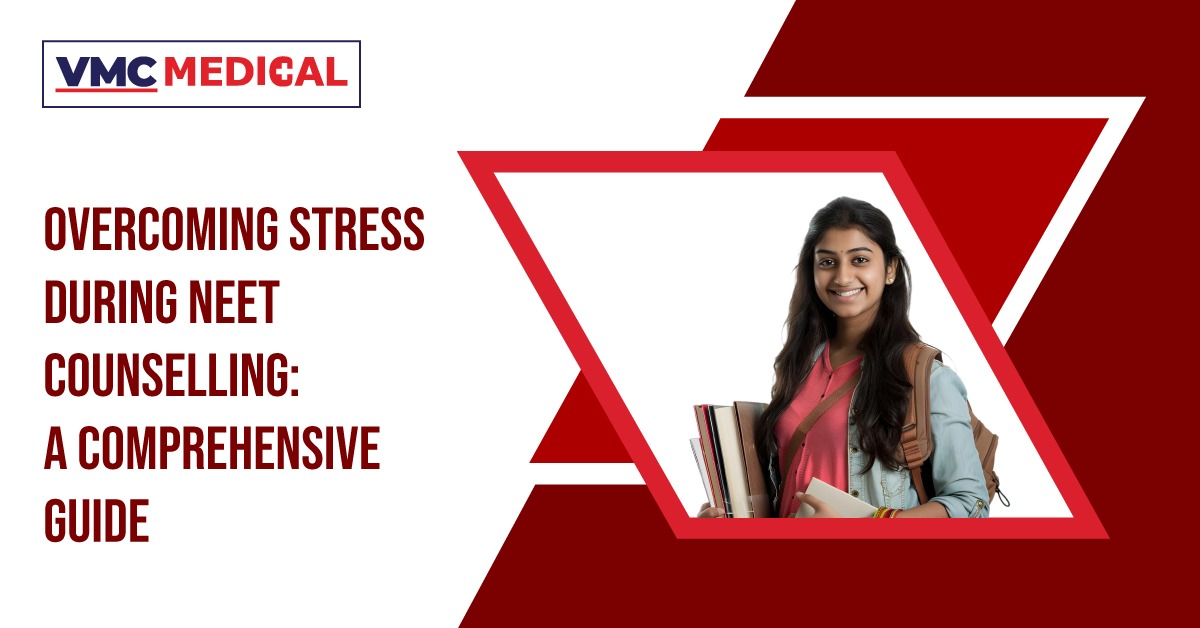Overcoming Stress During NEET Counselling: A Comprehensive Guide
 Posted On
Posted On
246 total views, 1 views today
The National Eligibility cum Entrance Test (NEET) counselling is a crucial juncture for aspiring medical students in India. It’s a process that determines their future in the medical field, making it a highly stressful period. The pressure to secure a seat in a desired medical college coupled with the uncertainty of the outcome can lead to immense stress and anxiety. However, with the right strategies and mindset, it’s possible to navigate through this phase with confidence and composure. In this blog, we’ll explore effective ways to overcome stress during NEET counselling.
Understanding the Source of Stress: Before delving into coping mechanisms, it’s essential to understand the sources of stress during NEET counselling. Some common stressors include:
- Fear of Rejection: The fear of not securing a seat in a preferred medical college can be overwhelming.
- High Expectations: Pressure from family, peers, and oneself to perform exceptionally well can contribute to stress.
- Uncertainty: The unpredictable nature of the counselling process adds to the anxiety.
- Comparison: Constant comparison with peers and their achievements can lead to feelings of inadequacy.
- Future Concerns: Concerns about the future career prospects and success in the medical field can also cause stress.
Now, let’s explore strategies to address these stressors effectively:
- Prepare Well: Preparation is key to confidence. Ensure thorough preparation for counselling sessions by researching colleges, understanding the admission process, and gathering all necessary documents beforehand. Having a clear plan can alleviate some of the uncertainty and anxiety.
- Manage Expectations: While aiming high is commendable, it’s crucial to set realistic expectations. Understand that not everything is under your control, and there are multiple factors influencing the outcome of NEET counselling. Focus on giving your best rather than fixating on specific outcomes.
- Practice Mindfulness: Mindfulness techniques, such as deep breathing, meditation, and yoga, can help calm the mind and reduce stress levels. Incorporate these practices into your daily routine, especially during times of heightened stress.
- Stay Positive: Cultivate a positive mindset by focusing on your strengths and past achievements. Envision achievement and reaffirm your strengths. Surround yourself with people who support and inspire you, lifting you up along the way.
- Seek Support: Don’t hesitate to seek support from friends, family, or mentors during this time. Talking about your concerns with someone you trust can provide emotional reassurance and perspective. Additionally, consider joining online forums or support groups where you can connect with others going through similar experiences.
- Maintain Balance: Balance your study schedule with relaxation activities and hobbies that you enjoy. Engage in activities that help you unwind and recharge, whether it’s reading, listening to music, or spending time outdoors. Taking regular breaks is essential for maintaining mental well-being.
- Focus on the Present: Instead of dwelling on what-ifs and future uncertainties, focus on the present moment. Break down the counselling process into smaller, manageable steps, and tackle them one at a time. Stay grounded in the present and trust in your ability to handle whatever comes your way.
- Stay Flexible: Understand that things may not always go as planned, and that’s okay. Be flexible and adaptable in your approach, and be prepared to adjust your strategies if needed. Remind yourself that setbacks are fleeting, and you possess the resilience to surmount them.
- Practice Self-Compassion: Be kind to yourself throughout this process. Recognize your hard work and growth, irrespective of the result. Extend to yourself the same compassion and support you’d readily give to a friend navigating a similar circumstance.
- Seek Professional Help if Needed: If you find that stress is significantly impacting your well-being and ability to cope, don’t hesitate to seek professional help. A counselor or therapist can provide guidance and support tailored to your specific needs.
Final Thoughts:
NEET counselling can be a challenging and stressful experience, but it’s important to remember that you’re not alone in this journey. By implementing the strategies discussed in this blog and prioritizing self-care, you can navigate through this phase with resilience and confidence. Remember to stay focused, stay positive, and believe in your ability to overcome obstacles. Your hard work and perseverance will ultimately lead you to success in your medical career.




